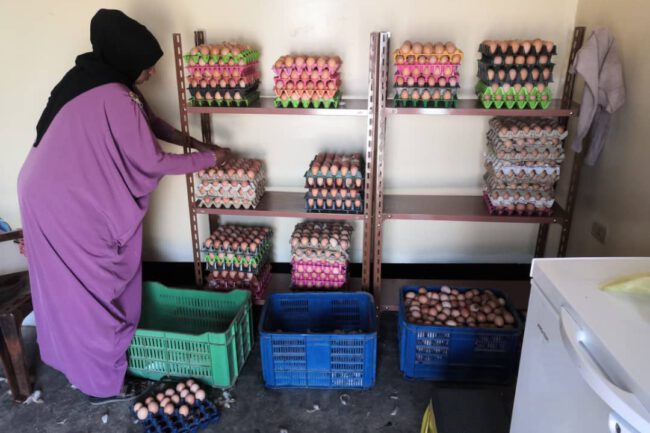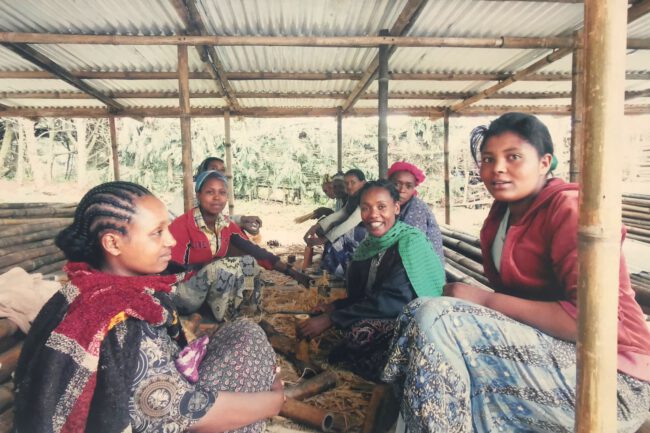Country Portfolio Ethiopia
In 2022, CFYE launched a Call for Solutions in Ethiopia to co-invest in innovative private sector-led initiatives that provide businesses with access to suitably skilled personnel and realise employment for youth. The below portfolio represents the winners of the first Call for Solutions. The Country Lead is Fiona Bailey.
Ethiopia’s Job Market & Youth
With one of the youngest populations globally, Ethiopia’s working-age population was projected to reach approximately 75 million by 2025. Despite the influx of the younger working population, youth unemployment is driven mainly by inexperienced first-time job seekers. The lack of experience coupled with the lack of entry-level opportunities, compounds this problem. With more than two million entrants to the labor market each year, it is clear that there are not enough decent opportunities being created for Ethiopian youth. Even more so for young women who hold an altogether disproportionately high rate standing at 32%. With a backlog of at least 2.5 million unemployed in 2018, the country must create 2.8 million jobs per year from 2020 to 2025.
In 2022, the Ethiopia socioeconomic survey showed that 32% of women between the age of 15 and 19; and 68% of women between the age of 20 and 24 are not in employment, education, or training (NEET). This means, they are neither gaining experience in the labour market, nor receiving an income from work, nor enhancing their education and skills. Clearly, their full potential is not being realized, though many may be contributing to the economy through unpaid work, which is particularly true of young women. However, the data shows for their men counterpart with the same age bracket of 1—19 and 20-24 is 29% and 47% respectively. Young men in this age group are less likely to be NEET due to continued enrolment in education or finding employment. Besides, young women between the ages of 20 and 24 in Ethiopia are more likely than men to become married without furthering their education or entering the labour market.
The CFYE Youth Action Research found that a significant proportion of the youth aspires to be employed within IT, communication, leadership, agriculture, healthcare, and advocacy roles.
It is a common conception of the youth in Ethiopia, that their education has not fully equipped them for the job market. Employers also report a deficiency in the level of soft skills, acknowledging a need for extensive training in this field. Action is required to both stimulate economic growth and address the skills mismatch in the labour market. The Challenge Fund for Youth Employment will focus on co-funding initiatives with a short to medium-term impact, considering the structural barriers and testing innovative approaches that carry spillover effects on the systemic/macro-economic level.
Our Impact
Our Portfolio in Ethiopia
In the context of Ethiopia, there are several challenges that affect youth employment. Here are some of the key challenges:
- Limited job opportunities: Ethiopia has a rapidly growing population, and the job market struggles to keep up with the increasing number of youth entering the labor force. The lack of diversified industries and limited job opportunities in the formal sector make it difficult for young people to find suitable employment.
- Education and skills mismatch: There is often a mismatch between the skills acquired by young people through education and training and the skills required by the job market. The education system may not align with the needs of the labor market, leading to a surplus of graduates in certain fields and a shortage in others. This mismatch makes it challenging for youth to find employment that matches their qualifications.
- Rural-urban divide: Ethiopia has a predominantly agrarian economy, with a significant portion of the population engaged in subsistence farming. Many young people from rural areas migrate to urban areas in search of better employment opportunities. However, the urban job market is highly competitive, and these migrants often lack the necessary skills.
- Informal sector dominance: The informal sector plays a significant role in Ethiopia’s economy, employing a large portion of the population, including youth. However, jobs in the informal sector are often characterized by low wages, lack of social protection, and limited opportunities for career advancement. Many young people are forced to accept informal, underemployment and precarious work due to the lack of formal employment options.
- Gender disparities: Gender disparities persist in the Ethiopian labor market, with young women facing additional challenges in accessing employment opportunities. Sociocultural norms, limited access to education, and traditional gender roles contribute to the gender gap in youth employment. Young women often face discrimination and barriers to entering the workforce or advancing in their careers.
- Limited access to finance: Many young entrepreneurs and small business owners face challenges in accessing finance to start or expand their businesses. Limited access to credit and financial services hinders the ability of young people to create their own employment opportunities and contribute to economic growth.
- Political and economic instability: Political instability and economic fluctuations can adversely affect youth employment. Uncertain macroeconomic conditions, such as high inflation rates or currency devaluation, can impact job creation and business growth, making it difficult for young people to secure stable employment.
Addressing these challenges requires a multi-faceted approach that includes improving the education system, promoting vocational and technical training, encouraging entrepreneurship, creating an enabling business environment, promoting gender equality, and implementing targeted youth employment programs.
Stemming from Ethiopian youth’s ambitions and the current needs of the employment market, we developed a portfolio that prioritizes work in agricultural and last-mile solutions.
The total number of planned jobs based on the portfolio will surpass 21.000. Around 11.000 of these projected jobs will be new jobs, while the rest will be mostly realized by improving the conditions of existing jobs to achieve decency in work and additional smaller number of jobs will be generated through the matching pathway.
More than 50% (roughly 11.000) of the planned jobs to be created in Ethiopia will be for young women.
CFYE’s Ethiopian portfolio clearly reflects the youth’s and employment market’s ambitions in developing the agricultural and last-mile employment sector. Our partners operate in innovative fields, catering to the desires and skills of youth.
With CFYE’s investment, we will be able to scale the impact of our innovative business model to reduce unemployment in Ethiopia. We will engage women and youth in agricultural transformation which will empower and enable them to develop professionally and invest in their future.
The technical support from CFYE, supplemented with our matching contribution, will allow us to create meaningful employment opportunities for 2,000+ agroforestry practising smallholder farmers. We will invest in an integrated sourcing to market strategy to create and match decent job opportunities.
We are focused on empowering women and youth through Ethiopia’s Bamboo value chain. With CFYE’s grant, we can expand our operations by creating a marketplace to trade in bamboo goods. More women and youth will therefore have better prospects for personal development, a stable income, social protection, and safe working conditions.
CFYE’s grant will enable us to expedite our operations and boost women’s entrepreneurship at the last mile. This will ultimately lead to more created jobs and improved working conditions by developing transferable digital, financial, and soft skills matched to the services common to market-driven, dynamic retailers and shopkeepers.




